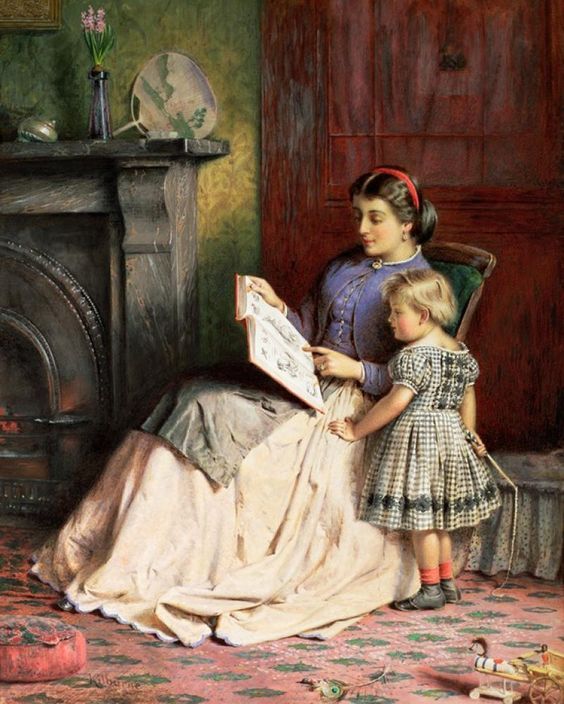
Friday
Scientific American recently reported on a study claiming that a childhood surrounded by books makes you smarter, even if you don’t actually read them. According to Karen Hopkins, Australian researchers have proved that “growing up in a home with a sizable library enhances literacy, number sense and even technological know-how in later life.”
Apparently this is due to “the radiation effect”:
Radiation effect is a situation where children grow up around books, but they don’t read books, but somehow books benefit them even though they don’t read them as much as maybe their parents would like them to.
According to the researchers,
What we were able to demonstrate was that people who grew up around books had better literacy, numeracy and digital problem-solving skills than people who had fewer books growing up but had similar education levels, similar jobs and even similar adult habits in terms of reading or engaging in various numeracy-enhancing activities.”
A key finding, Hopkins notes, was that “teens who only made it through high school but were raised in a bookish environment fared as well in adulthood as college grads who grew up in a house bereft of books.”
And now for the researchers’ explanation:
“So if we grow up in a house, in a home where parents enjoy books, where books are given as birthday presents and cherished and valued, this is something that becomes a part of our identity and gives us this lifelong incentive to be literacy oriented, to always kind of steer towards books and read more than we would otherwise.”
I don’t really need the study to explain my own love of books since my academic parents read to me and my brothers every night through middle school. Reading, in fact, was our major entertainment as they refused to buy a television. All four of us went on to get advanced degrees.
It does cast an interesting light on my wife, however, who was raised on an Iowa farm. Although Julia’s father did not attend college, he loved to read and subscribed to Time’s Book of the Month club, which brought contemporary novels into the home. Julia’s mother, meanwhile, was a school teacher who would read Black Beauty, The Swiss Family Robinson, and other such works to the four children. Julia recalls her rocking in the hallway outside the bedrooms as she read and that, sometimes, the rocking and reading would abruptly stop as she fell asleep.
The values had been transmitted, however, and all four children would go off to college, as would their children. Julia herself became a teacher with an M.A. in reading.
Could one, for the sake of the children, cynically fill one’s house with books, even while having no intention of reading them? I think of Gatsby’s library, where books operate as a status symbol:
A stout, middle-aged man, with enormous owl-eyed spectacles, was sitting somewhat drunk on the edge of a great table, staring with unsteady concentration at the shelves of books. As we entered he wheeled excitedly around and examined Jordan from head to foot.
“What do you think?” he demanded impetuously.
“About what?”He waved his hand toward the book-shelves.
“About that. As a matter of fact you needn’t bother to ascertain. I ascertained. They’re real.”
“The books?”
He nodded.
“Absolutely real — have pages and everything. I thought they’d be a nice durable cardboard. Matter of fact, they’re absolutely real. Pages and — Here! Lemme show you.”
Taking our skepticism for granted, he rushed to the bookcases and returned with Volume One of the “Stoddard Lectures.”
“See!” he cried triumphantly. “It’s a bona-fide piece of printed matter. It fooled me. This fella’s a regular Belasco. It’s a triumph. What thoroughness! What realism! Knew when to stop, too — didn’t cut the pages. But what do you want? What do you expect?”
To be sure, it’s preferable to cut the pages and actually read the books. But Gatsby at least gestures towards them, and we see the library’s origins in an item in his boyhood “General Resolves” list: “Read one improving book or magazine per week.”
According to the Australian researchers, Gatsby’s library in and of itself has a salutary effect.
Further thought: Owning books without reading them brings to mind the La Rochefoucauld maxim, “Hypocrisy is the homage that vice pays to virtue.” Homage paid is better than no homage at all. I don’t researchers don’t appear to make a distinction, however, between the mere presence of books and an actual mere “bookish culture” that the researchers mention as important.
Incidentally, there’s one book that Gatsby actually read. Nick mentions finding a tattered copy of Clarence Mulford’s 1910 western Hopalong Cassidy among Gatsby’s childhood possessions. We can see why Gatsby would have loved the novel from the opening sentence:
The raw and mighty West, the greatest stage in all the history of the world for so many deeds of daring which verged on the insane, was seared and cross-barred with grave-lined trails and dotted with presumptuous, mushroom towns of brief stay, whose inhabitants flung their primal passions in the face of humanity and laughed in condescending contempt at what humanity had to say about it.
Hopalong, of course, rises to every challenge and is rewarded in the end by a significant promotion.

